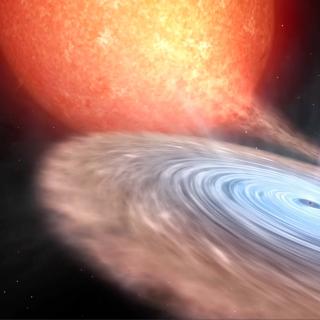Bibcode
Ahmed, O.; Degenaar, N.; Wijnands, R.; Armas Padilla, M.
Bibliographical reference
Revista Mexicana de Astronomia y Astrofisica
Advertised on:
10
2024
Citations
0
Refereed citations
0
Description
XMMSL1 J171900.4–353217 is a very-faint X-ray transient that was discovered in 2010 March when it exhibited an outburst. We report on 7 observations, obtained with the X-Ray Telescope (XRT) aboard the Neil Gehrels Swift Observatory between 2010 May and October. By fitting a single absorbed power-law model to the XRT spectra, we infer power-law indices of Γ = 1.8 &minus 2.7 and an absorption column density of NH = (4.6‑7.9)×1022 cm‑2. The inferred 0.5‑10 keV luminosity fluctuated irregularly and peaked at LX ≃ 1035 ‑ 1036 erg s‑1 for a distance of 4 ‑ 12 kpc. Based on the evolution of the power-law index with varying luminosity, we propose that the source most likely is a transient neutron star low-mass X-ray binary located at several kpc. If true, it would be a good candidate to search for coherent millisecond pulsations when it enters a new accretion outburst.
Related projects

Black holes, neutron stars, white dwarfs and their local environment
Accreting black-holes and neutron stars in X-ray binaries provide an ideal laboratory for exploring the physics of compact objects, yielding not only confirmation of the existence of stellar mass black holes via dynamical mass measurements, but also the best opportunity for probing high-gravity environments and the physics of accretion; the most
Montserrat
Armas Padilla